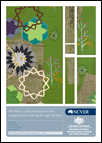Description
Skill sets are a grouping of one or more competencies below the level of a full qualification that meet a client skills need, such as a licensing or compliance requirement or specific knowledge of an emerging area. A point of debate is the role that skills sets play compared to full qualifications, which are seen as the foundation of the vocational education and training (VET) system. To throw some light on this issue, John Mills and his colleagues undertook a case study of agrifood students, which investigated the use of skill sets by students enrolled in Rural Production Studies skill sets developed by TAFE NSW and those enrolled in the Diploma of Agriculture.
Summary
About the research
Skill sets are a grouping of one or more competencies below the level of a full qualification that meet a client skills need, such as a licensing or compliance requirement or specific knowledge in an emerging area. They are contained in training packages, which are the mechanism by which learning outcomes are defined in Australia's vocational education and training (VET) system.
A point of debate is the role that skill sets play compared with full qualifications, which are seen as the foundation of the VET system. To throw some light on this issue, John Mills and his colleagues undertook a case study of agrifood students, which investigated the use of skill sets by students enrolled in Rural Production Studies skill sets developed by TAFE NSW and those enrolled in the Diploma of Agriculture.
Key messages
- Licensing and compliance, upgrading skills and gaining specific knowledge in an emerging area are the main reasons for undertaking skill set training.
- In many cases skill sets aided engagement in VET and were used as a stepping stone to the completion of full qualifications, suggesting that skill sets should not be seen as a threat to full qualifications.
Skill sets can be defined in training packages, or developed by individual registered training organisations. The authors see the distinction between the two as an artificial construct and suggest that both should have equal status. They are also critical of the rules associated with skill sets; in particular rules that affect the responsiveness of the VET system, including not allowing for flexibility in the design of skills sets and the process whereby industry skills councils endorse skill sets in training packages.
Tom Karmel
Managing Director, NCVER
Download
Related items
In this interview, Steve Davis talks with co-author Kaye Bowman about the report ‘Workforce skills d… Show more
The paper outlines the difference between the skill sets developed by national VET industry bodies i… Show more
